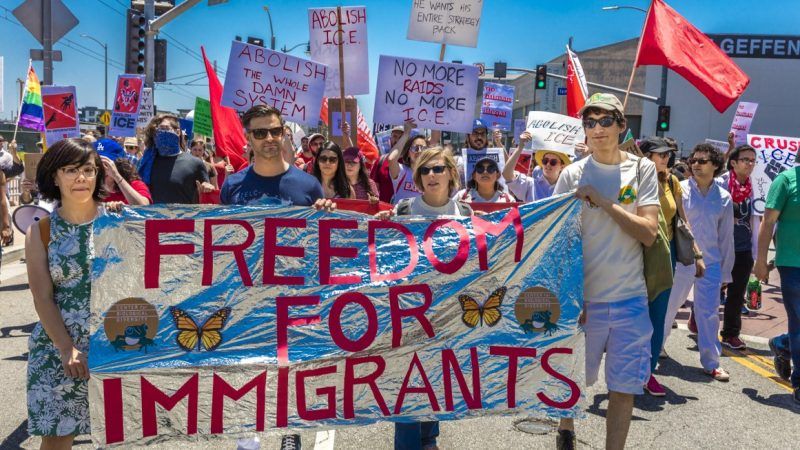California's Sanctuary Laws Survive Another Trump Challenge
Federal judges rule state cannot be forced to assist immigration officials.

California can keep all its sanctuary cities and limit local both law enforcement cooperation and private employer cooperation with immigration officials, ruled a panel of federal circuit judges.
The Department of Justice has been challenging three immigration-focused laws passed by California in 2017. One (SB 54) essentially turned the entire state into an immigration "sanctuary," significantly restricting the ability of law enforcement officers within the state from assisting the Department of Homeland Security in tracking down or detaining illegal immigrants unless they have been convicted of certain crimes. The second (AB 450) prohibits private businesses from voluntarily allowing federal immigration officials to enter non-public areas of their companies, as well as preventing them from accessing their records unless the feds have warrants. The third (AB 103) imposes inspection requirements on federal immigration detention facilities within California.
The Department of Justice argued that all of these laws are pre-empted by federal government immigration law and inappropriately attempted to impose burdens on the feds. Not so for two of those laws, said three judges with the U.S. District Court for the Eastern District of California. It's federalism!
The judges' reasoning for rejecting the feds should be familiar to anybody who paid attention to the conflicts as states started legalizing marijuana for medical use. It's true that the federal government has the authority to round up people in the country illegally or anybody who has committed crimes that allow for deportation. But the federal government lacks the authority to demand state-level assistance in enforcing federal immigration guidelines, much like the federal government cannot force state or local police to arrest people for violating federal drug laws.
"SB 54 may well frustrate the federal government's immigration enforcement efforts," the panel ruled. "However, whatever the wisdom of the underlying policy adopted by California, that frustration is permissible, because California has the right, pursuant to the anti-commandeering rule, to refrain from assisting with federal efforts."
For AB 450, the Justice Department argued that the bill intruded on the relationship between the feds and employers and attempted to impose requirements on federal inspections that weren't authorized by Congress. Here the judges said that, actually, the imposition is on the relationship between employers and employees. It controls what employers must and must not do, not what the feds can do. The feds can certainly ask an employer to let them inspect a facility without a warrant. But it's the employer that will get punished if he or she cooperates.
That may sound like a weird dodge, but it does raise the question of what would happen if a business owner challenged the law. By what authority does the state of California tell private citizens when they can cooperate with immigration officials? That's significantly different from telling government employees when they can work with the feds.
The judges did determine that AB 103 does, unlike AB 450, burden the federal government with demands that are out of the scope of California's authority in part and that a lower court erred when it concluded this burden was not significant.
So in the end, the court rejected the Department of Justice's attempts to stop the first two laws from being implemented and sent the third one back down to a lower court for a second look. It's another loss for the Trump administration, whose legal efforts against sanctuary city practices have been largely unsuccessful.
Read the ruling here.
Show Comments (37)